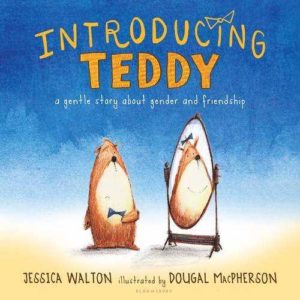 LONDON — A homosexual and transgender advocacy group is raising concerns after it recently placed children’s books about gender identity on a recommended reading list for nursery and primary schools in the UK, potentially exposing children as young as three to stories about those who are questioning their birth sex.
LONDON — A homosexual and transgender advocacy group is raising concerns after it recently placed children’s books about gender identity on a recommended reading list for nursery and primary schools in the UK, potentially exposing children as young as three to stories about those who are questioning their birth sex.
According to its website, the organization Educate & Celebrate, headquartered in London, works to “implement an LGBT+Inclusive curriculum to successfully eradicate homophobia, biphobia and transphobia from our nursery, primary and secondary schools, colleges, universities, organizations and communities.”
As a part of this goal, it recently recommended books such as “Introducing Teddy: A Gentle Story About Gender and Friendship” and “Are You a Boy or Are You a Girl?” on its nursery and primary school reading lists.
The first book tells the story of a teddy bear named Thomas who tells his friend Errol that he really feels like a girl on the inside.
“In my heart, I’ve always known that I’m a girl teddy, not a boy teddy. I wish my name was Tilly, not Thomas,” he states.
Errol then affirms Thomas’ feelings and tells him that he doesn’t care if he is a boy or girl.
The second book is a story about a child named Tiny who seeks to eliminate “stereotypes” surrounding the characteristics and interests of boys and girls.
“Isn’t it time we stopped putting our children in pink and blue boxes?” a description of the book reads on the website of author Sarah Savage. “Our main character, Tiny, prefers not to tell other children whether they are a boy or a girl; they like to play dress-up, as both a fairy and a knight in shining armour.”
According to the Daily Mail, other books on a reading list for slightly older students include “Jamie: A Transgender Cinderella Story” and “Gracefully Grayson.”
Educate & Celebrate Founder Elly Barnes told reporters that she believes such books are necessary to “break the heteronormative model” and to teach children to be accepting of lifestyles outside of the norm.
“The book collections we have sourced for schools are much needed to break the heteronormative model to reflect real-life families, which come in all different shapes and sizes,” she said.
“Our young people are not born racist, sexist, homophobic or transphobic,” Barnes added. “The problem lies with the grown-ups and giving them the confidence and the resources to be inclusive of gender identity and sexual orientation—the books provide an accessible way for teachers to do this.”
However, Chris McGovern of the Campaign for Real Education said that young children should not be confused by presenting discussions about gender identity.
“I do not question the intentions of the people using and promoting this material, but it is misguided,” he told the Daily Mail. “They are inflicting adult neuroses about gender onto children who are not interested in gender. Children do not have issues about their gender in 99.9% of cases.”
“Adults need to stop thinking children see the world the way they do. They do not,” McGovern continued. “They may play at being a goblin one day, a dragon the next. They do not see the world in the way adults do and inflicting adult neuroses about gender onto children is damaging and cruel.”
Become a Christian News Network Supporter...


